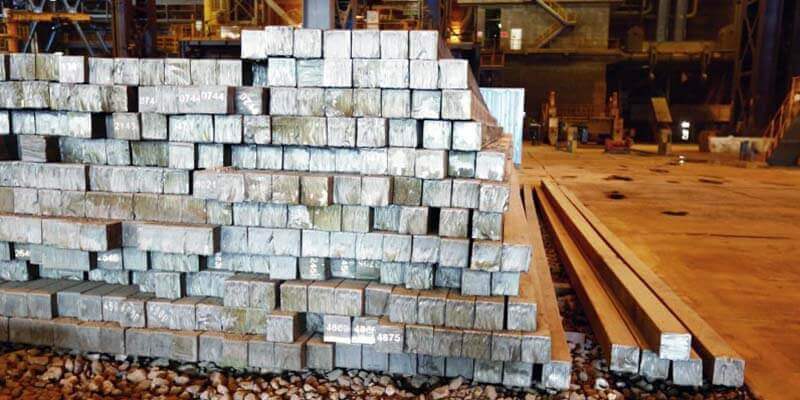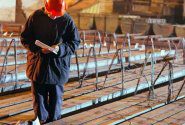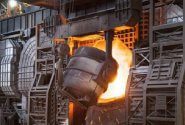In the current situation, the sale of crude steel, along with the cheap sale of crude steel, has become a serious problem in the Iranian steel industry. We are witnessing the uncontrolled sale and export of crude steel by some crude steel producers. This issue should be on the agenda of the government and the Ministry of Silence as a challenge. In the following, we will refer to the different dimensions of steel crude sales. Please be with Artan Press.
*** Selling raw steel under the pretext of selling more
Unfortunately, in the current situation, the sale of crude steel has become a pendant for more sales in international markets. Rising global steel prices have led producers to make every effort to maximize steel sales in global markets. Studies have shown that in some cases, rebar is offered to them cheaper due to incentives for foreign countries and compensation. The sale of crude steel in the rebar sector has taken place in a situation where this product is being exchanged at its historical maximum price in the domestic market.
*** Cheap sale of Iranian rebar in international markets
Cheap and raw steel sales in the rebar sector have made the voice of domestic consumers. Now, in some cases, even though electricity and energy are consumed, steel is converted into rebar, which is a more valuable product. Rebar is sold to other countries at a lower price than domestically. This is a real example of oppression of the domestic consumer. Prices in the interior of Iran are designed in such a way that there is practically no purchase for the domestic market. Therefore, this situation has given an excuse to the manufacturer to be able to sell steel products cheaply. The sale of crude steel, and especially rebars, could have serious consequences for the construction industry in the future.
*** Evaluation of crude sales footprint in the Iranian steel market
But why has the sale of crude steel been institutionalized and widespread in Iran? One of the main reasons is that the destination countries that seek to import steel raw and semi-raw materials do not consider duties on the import of steel ingots, so the ingots enter the destination country at the same price as in Iran. The sale of crude steel in the ingots sector is a great injustice to the steel industry in the current situation.
Because the countries of destination impose tariffs on the import of rebar, which is the final product, the rebar is provided to them at a lower price so that import duties are economically viable for the destination countries. This level of mismanagement and looting of national capital has been unprecedented. We heard in the news that the continuation of crude steel extraction will paralyze Iranian steel in the next 20 years. Knowing this, there is no rationale for selling crude steel in the current situation.
*** Pathology of selling Iranian steel
To compensate for this, we have to impose tariffs on the export of our raw materials. Raw steel sales in Iran are out of the ordinary. Investigations and follow-ups have shown that in some cases, rebar is cheaper than domestically due to incentives for foreign countries and compensation. Parliament has reacted to the sale of crude steel. In this regard, the plan for sustainable development and production of steel chains, which has been reviewed by the Industries and Mines Commission and is currently being reviewed in public. In this plan, steel is offered on the stock exchange, so pricing is not done. According to this plan, the steel committee, which consists of different members, determines the base price of steel, but the supply of steel on the stock exchange is in accordance with the rules governing it.
*** Parliament enters the sale of crude steel
One of the solutions to control the sale of crude steel is not to consider a ceiling for the price of steel in the plan of the Industries and Mines Commission. Currently, steel products are not fully listed on the stock exchange; In 1999 and 1998, for example, only 25 percent of some steel products were traded on the stock exchange and the rest on the black market. In this regard, the Deputy Attorney General warned against the indiscriminate export of crude steel and the loss of downstream units and called for the involvement of the responsible agencies in the judiciary and regulatory bodies.
*** crude steel sales and entering the bankruptcy frontier
The sale of crude steel should not be at the cost of destroying the steel industry and the Iranian economy. In the current situation, no country in the world exposes its raw resources to buying and trading in this way. The country’s capital and mineral resources are subject to looting and crude sales, and the price of steel inputs is determined at the rate of CIS (Commonwealth) and global FOB, with the authority of Metal Bulletin (London Stock Exchange) and Pellets (another reliable source of mineral prices). What does it mean even though the entire production chain of steel inputs is supplied and calculated in rials, labor and cheap energy? Today, the messy supply of ingots and sheets has exposed hundreds of thousands of workers in the conversion industry to unemployment.
*** Export of steel at the cost of destroying domestic demand
The sale of crude steel is not compatible with any reason, and what is clear is that the continuation of this trend will completely eliminate the Iranian steel market. In a situation where domestic prices are higher than international prices, the domestic market must be stabilized by controlling supply and demand. It seems that no one cares about the current state of the domestic market. The supply of substandard ingots on the stock exchange, the reasonable refusal of the customer to buy substandard goods and the inference of obtaining an export license for ingots, the new engineering of the Taliban, the lack of transparency in the supply of steel, the beheading and destruction of conversion industries and unemployment of rolling workers. Do we believe that everything happens in the context of the rules of economics?
*** Focus on export-oriented production instead of selling crude steel
Export-oriented production for replacement Export of current steel or iron ore with complementary products, which is fortunately established and launched as far as the horizon of 1404 steel complementary industries. One of the most important approaches now to deal with the sale of crude steel is to impose a tax on the export of crude and low-value steel at present, with special attention to the existing finishing industries and planning for the development of small and medium finishing industries.
*** Access to real statistics on export invoices
It is very important to have access to real production and export statistics and nominal and real capacities in the steel chain sector on the one hand, and to deal with domestic high prices or the requirement to sell cheaply to a specific sector. The sale of crude steel must be identified in the steel chain. In the steel chain and having a plan to balance the profits of the chain and eliminate absolute monopolies is one of the most important current functions of executives in the steel sector. Examining the system of tariffs and import and export duties so that the raw materials of complementary industries have the lowest import tariffs and the highest export duties. The import of final products in a step-by-step manner has the highest tariff and the import of raw materials has a zero tariff
*** Asymmetric government support for domestic industries
Government support for industry is not uniform. Support programs are not evenly and fairly distributed among manufacturers. The lobbying and power of some manufacturers is influential in directing such support. Thus, we see that some steel chain activists with strong lobbying enjoy more advantages in the production path. In order to control the sale of crude steel in the market, it should be a priority to review the annoying directives and revoke the retroactive orders and to prevent the creation of clock creation decisions in the ministries.
*** The need to cancel the tax exemptions for crude sellers
The abolition of the tax exemption for crude traders in the domestic chain of buyers at world prices should be done as soon as possible with the aim of eliminating the sale of crude steel. According to the Association of Steel Rollers, in the world markets, the price gap between ingots and rebars is about 10 to 13 percent and other steel sections are 13 to 17 percent. However, in the whole steel chain, only the price of ingots is determined based on world prices and the rest of the sections are determined in Rials and based on market elasticity. For this reason, with exchange rate fluctuations, the price gap between raw materials and products sometimes falls below three percent.
این مطلب بدون برچسب می باشد.












ثبت دیدگاه